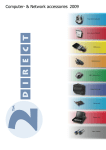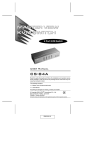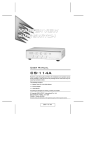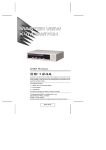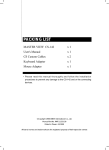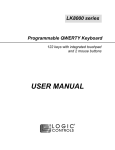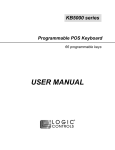Download ATEN CS-72M User manual
Transcript
PS/2 KVM Switch USER MANUAL CS-82A / CS-84A FCC Information This equipment has been tested and found to comply with the limits for a Class B digital device, pursuant to Part 15 of the FCC Rules. These limits are designed to provide reasonable protection against harmful interference in a residential installation. This equipment generates, uses and can radiate radio frequency energy, and if not installed and used in accordance with the instruction manual, may cause interference to radio communications. However, there is no guarantee that interference will not occur in a particular installation. If this equipment does cause harmful interference to radio or television reception, which can be determined by turning the equipment off and on, the user is encouraged to try to correct the interference by one or more of the following measures: Reorient or relocate the receiving antenna; Increase the separation between the equipment and receiver; Connect the equipment into an outlet on a circuit different from that which the receiver is connected; Consult the dealer or an experienced radio/television technician for help. RoHS This product is RoHS compliant. SJ/T 11364-2006 The following contains information that relates to China. CS-82A / CS-84A User Manual Online Registration You can register your product at our online support center: International http://support.aten.com North America http://www.aten-usa.com/product_registration Online Support International Email Support Online Support [email protected] Technical Support http://support.aten.com Troubleshooting Documentation Software Updates http://www.aten.com Telephone Support 886-2-8692-6959 North America Email Support Online Support ATEN TECH [email protected] ATEN NJ [email protected] Technical Support ATEN TECH http://www.aten-usa.com/support ATEN NJ http://support.aten.com Troubleshooting Documentation SW Updates ATEN TECH http://www.aten-usa.com ATEN NJ http://www.aten.com ATEN TECH 1-888-999-ATEN ATEN NJ 1-732-356-1703 Telephone Support -3- Package Contents The CS-82A / CS-84A KVM Switch package contains the following items: 1 CS-82A or CS-84A KVM Switch 2 Custom KVM Cable Sets (CS-82AC package only) 4 Custom KVM Cable Sets (CS-84AC package only) 1 User Manual* Check to make sure that all the components are present and that nothing got damaged in shipping. If you encounter a problem, contact your dealer. Read this manual thoroughly and follow the installation and operation procedures carefully to prevent any damage to the unit, and/or any of the devices connected to it. * Features may have been added to the CS-82A / CS-84A since this manual was printed. Please visit our website to download the most up-to-date version of the manual. Copyright © 2008–2009 ATEN® International Co., Ltd. Manual Part No. PAPE-1217-4ATG Printing Date: 2009-03-26 ATEN and the ATEN logo are trademarks of ATEN International Co., Ltd. All rights reserved. All other trademarks are the property of their respective owners. -4- Overview The CS-82A / CS-84A 2/4-Port PS/2 KVM (Keyboard, Video, Mouse) Switch is a control unit that allows access to two/four computers from a single PS/2 console (keyboard, monitor and mouse). Before the development of the Master View, the only way to control multiple computer configurations from a single console was through a complex and costly network system. Now, with the CS-82A / CS-84A, you can easily access two/four computers in a cost effective manner. Setup is fast and easy; plugging cables into their appropriate ports is all that is entailed. There is no software to configure; there are no installation routines, and no incompatibility problems. Since the CS-82A / CS-84A intercepts keyboard input directly, it works on any hardware platform and with all operating systems.* The CS-82A / CS-84A provides two convenient methods to access the computers connected to the system: 1) Port selection pushbuttons located on the unit's front panel; and 2) Hotkey combinations entered from the keyboard. There is no better way to save time and money than with a CS82A / CS-84A installation. Since a single console manages all of the computers, the CS-82A / CS-84A setup: 1) eliminates the expense of having to purchase a separate keyboard, monitor, and mouse for each computer; 2) saves all the space those extra components would take up; 3) saves on energy costs; and 4) eliminates the inconvenience and wasted effort involved in constantly moving around from one computer to another. Note: Mac and Sun systems may require an additional adapter. Please see www.aten.com or contact your dealer for details. -5- Features One PS/2 console controls two (CS-82A) or four (CS-84A) computers Easy to install – no software required – connecting cables is all it takes Computer selection via front panel pushbuttons and hotkeys Multiplatform support – Windows 2000/XP/Vista, Linux, FreeBSD, Mac*, and Sun*. Superior video quality – up to 1920 x 1440; DDC2B Compact, sturdy, durable metal housing Keyboard and mouse emulation for error-free booting Supports Microsoft Intellimouse and the scrolling wheel on most mice Auto Scan function to monitor computer operation Non-powered* Note: 1. Mac and Sun systems may require an additional adapter. Please see www.aten.com or contact your dealer for details. 2. The CS-82A / CS-84A can get its power from the computer. Therefore, use of a power adapter is optional and requires a separate purchase. A power adapter is only required if your installation exceeds 10 m. -6- System Requirements Console A VGA, SVGA, or multisync monitor capable of the highest resolution you will be using on any computer on the installation. A PS/2 keyboard A PS/2 mouse Computers The following equipment must be installed on each computer that is to be connected to the system: A VGA, SVGA, or multisync port A PS/2 keyboard port A PS/2 mouse port Cables Two or four custom KVM cable sets are provided with the CS82AC or CS-84AC packages only, as follows: CS82AC includes 2 x 1.2 m cables CS84AC includes 2 x 1.2 m and 2 x 1.8 m cables. If you have purchased the CS-82A or CS-84A package, note that only custom KVM cable sets specifically designed to work with this switch may be used. KVM cable sets are available in 1.2, 1.8, 3, 5, 10, and 20 meter lengths. Please please www.aten.com or contact your dealer for further details. Optional Accessories USB-to-PS/2 Converter – to connect to computers that do not have PS/2 ports. Sun Console Converter – to connect to Sun systems Power Adapter (DC9V, 300mA) – required if your installation exceeds 10 m. -7- Components Front View 3 1&2 No. Component Description 1 Port Selection Pushbuttons Press a pushbutton to access the computer attached to the corresponding port. 2 Port LEDs The Port LEDs are built into the Port Selection Pushbuttons. The upper ones are the On Line LEDs; the lower ones are the Selected LEDs: On Line Lights ORANGE to indicate that the computer attached to the corresponding port is up and running. Selected Lights GREEN to indicate that the computer attached to its corresponding port is the one that has the KVM focus. Note: Depending on the port’s status, the LED may flash according to a specific pattern. See the table under Troubleshooting, page 19. 3 Console Keyboard and Mouse ports The cables from your PS/2 keyboard and PS/2 mouse plug in here. Each port is color-coded and identified with an appropriate icon. Note: The component diagrams show the 4-port CS-84A. The CS-82A has two ports. -8- Rear View 1 2 No. Component Description 1 Console Video Connector The cable from your monitor plugs in here. 2 KVM Port Section The KVM cables that connect to the computer’s monitor, keyboard, and mouse ports plug in here. Each port is color-coded and identified by an appropriate icon.* Note: Since the KVM cables come with PS/2 connectors, certain hardware configurations (such as notebooks) that don’t have two PS/2 ports may require the use of a USB-to-PS/2 converter. Please see www.aten.com or contact your dealer for details. -9- Installation 1. Make sure that the power to any device that you connect to the installation has been turned off. You must unplug the power cords of any computers that have the Keyboard Power On function. 2. Make sure that all devices you will be installing are properly grounded. To set up your CS-82A / CS-84A installation, refer to the installation diagram on the next page (the numbers in the diagram corresponds to the steps, below), and do the following: 1. Plug your PS/2 keyboard, and PS/2 mouse into the Console ports located on the unit’s front panel. 2. Plug your monitor into the Console port located on the unit’s back panel. 3. Using the Custom KVM cable sets provided, plug the monitor, keyboard, and mouse connectors into the KVM Port sections of the CS-82A / CS-84A. 4. At the other end of the cable, plug the corresponding monitor, keyboard, and mouse connectors into their respective ports on the computers you are connecting. Note: Verify that all plugs are in the same KVM Port sockets (all in Port 1, all in Port 2, etc.). Each socket is marked with an appropriate icon. 5. If you choose to use external power (which is optional if your installation does not exceed 10 m), plug the power adapter into an AC power source, then plug the power adapter cable into the CS-82A / CS-84A’s power jack. 6. Turn on the power to the computers. Note: The CS-82A / CS-84A’s Power On default is to link to the first computer you turn on. - 10 - 1 5 3 4 2 - 11 - Operation Controlling all of the computers in your CS-82A / CS-84A installation from a single PS/2 console could not be easier. Two port selection methods that provide instant access are available: Manual Port Selection Hotkey Port Selection Manual Port Selection With Manual Port Selection you simply press the Port Selection Pushbutton that corresponds to the computer you want to access. The Selected LED lights to indicate which port is active. Hotkey Port Selection. Hotkey Port Selection allows you to select the active computer directly from the keyboard. Note: Hotkey operation is different for the CS-82A and the CS-84A. See the following sections for details. - 12 - CS-82A Hotkey Operation The CS-82A provides the following Hotkey Port Selection features: Selecting the active port Auto Scan Mode Selecting the Active Port The default method to toggle the KVM focus between the two ports from the keyboard is to tap the left or right Ctrl key twice: [Ctrl] [Ctrl] Note: The combination must be on the same side (both left or both right). If the Ctrl key combination conflicts with programs running on your computer, you can switch the hotkey to the Scroll Lock key by pressing and holding both the CS-82A’s Port Selection Pushbuttons for three seconds. After this, tap the Scroll Lock key twice to toggle the KVM focus. [Scroll Lock] [Scroll Lock] Note: To switch back to the default hotkey, press and hold both the Port Selection Pushbuttons for three seconds again. Auto Scan Mode The CS-82A’s Auto Scan feature automatically cycles the KVM focus through the two/four computers at regular five second intervals so that you can monitor their activity without switching from port to port manually. To invoke Auto Scan Mode, do the following: 1. Press and release [Left Shift]. 2. Press and release [Right Shift]. - 13 - Setting the CS-82A’s Scan Interval The default amount of time that the CS-82A dwells on each port is five seconds. You can change the scan interval at any time while Auto Scan is in effect by keying in a number from 1 to 4 that corresponds to the following scan intervals: Number Scan Interval 1 3 seconds 2 5 seconds (default) 3 10 seconds 4 20 seconds Once scanning begins, it continues until you press the [Spacebar] to exit Auto Scan Mode. The port that has the KVM focus at the time scanning stops remains active. Note: While Auto Scan Mode is in effect, the console will not function normally. You must exit Auto Scan Mode by pressing the [Spacebar] in order to regain control of the console. - 14 - CS-84A Hotkey Operation Hotkey operations for the CS-84A begin by pressing and releasing the [Alt+Ctrl+Shift] combination. Note: The combination must all be on the same side (i.e., [LeftAlt+LeftCtrl+LeftShift] or [RightAlt+RightCtrl+RightShift]). The CS-84A provides the following Hotkey Port Selection features: Selecting the active port Auto Scan Mode Last/Next Mode Selecting the Active Port Each KVM port is assigned a numeric ID (1–4). You can directly access any computer on the installation with a Hotkey combination that specifies the ID of the KVM port that the computer is connected to. The steps involved are: 1. Press and release [Alt+Ctrl+Shift]. 2. Key in the appropriate Port ID number (1, 2, 3, or 4). 3. Press [Enter] to complete your selection. Auto Scan Mode The CS-84A’s Auto Scan feature automatically cycles the KVM focus through the four computers at regular five second intervals so that you can monitor their activity without switching from port to port manually. To invoke Auto Scan Mode, do the following: 1. Press and release [Alt+Ctrl+Shift]. 2. Press 0 (zero). 3. Press [Enter]. - 15 - Once scanning begins, it continues until you press the [Spacebar] to exit Auto Scan Mode. The port that was currently active at the time scanning stopped remains active. Note: While Auto Scan Mode is in effect, the console will not function. You must exit Auto Scan Mode in order to regain control of the console. Last/Next Mode This feature allows you to switch between computers in order to monitor then manually. You can dwell on a particular port for as long as you like – as opposed to Auto Scan Mode, which switches after a fixed interval. To invoke Last/Next Mode, do the following: 1. Press and release [Alt+Ctrl+Shift]. 2. Press and release 9. 3. Press [Enter]. Once Last/Next Mode is active, pressing the left Shift Key [LShift] switches to the previous computer (from the currently active one); pressing [RShift] switches to the next computer in the installation. Note: 1. There is another, shorter Hotkey combination to invoke Last/Next Mode switching: Simply press the Left Ctrl key twice in succession ([LCtrl] + [LCtrl]) to switch to the previous computer; or press the Right Ctrl key twice ([RCtrl] + [RCtrl]) to switch to the next computer. This method is available all the time – it does not have to be invoked with [Alt+Ctrl+Shift]. 2. While Last/Next Mode is in effect, none of the other keyboard keys will function. You must exit Last/Next Mode be pressing the [Spacebar] in order to use the console for anything else. - 16 - Hotkey Summary Table Combination CS-82A CS-84A Action [LCtrl] [LCtrl] or [RCtrl] [RCtrl] Toggles access between the two computers (default). [Scroll Lock] [Scroll Lock] Toggles access between the two computers (alternate). [LShift] [RShift] Starts Auto Scan Mode. Key in a number from 1 to 4 to set the scan interval. [Spacebar] Exits Auto Scan Mode. [Alt+Ctrl+Shift] [Port ID] [Enter] Brings the KVM focus to the computer attached to the port corresponding to the specified Port ID. [Alt+Ctrl+Shift] [0] [Enter] Starts Auto Scan Mode [Alt+Ctrl+Shift] [9] [Enter] Invokes Last/Next Mode [LCtrl] + [LCtrl] Brings the focus to the previous computer. [RCtrl] + [RCtrl] Brings the focus to the next computer. Selected LED Display Activity Meaning Off Port is not selected. On (Steady) Port is connected to an active computer. Flashing (On and Off equal) Port is connected to an active computer and is being accessed in Auto Scan Mode. Flashing (On long; Off short) Port is connected to an active computer and is being accessed in Last/Next Mode. - 17 - Specifications Function CS-82A CS-84A 2 4 Computer Connections Port Selection Console Connectors Pushbuttons, Hotkeys Keyboard Video Mouse Computer Connectors 1 x 6-pin Mini-DIN Female (Purple) 1 x HDB-15 Female 1 x 6-pin Mini-DIN Female (Green) Keyboard 2 x 6-pin Mini-DIN Female (Purple) 4 x 6-pin Mini-DIN Female (Purple) Video 2 x HDB-15 Male 4 x HDB-15 Male Mouse 2 x 6-pin Mini-DIN Female (Green) 4 x 6-pin Mini-DIN Female (Green) Switches 2 x Pushbutton 4 x Pushbutton LEDs On Line 2 (Orange) 4 (Orange) Selected 2 (Green) Emulation Keyboard / Mouse Video 1920 x 1440; DDC2B Scan Interval Power Consumption 3, 5, 10, 20 seconds 5 seconds DC9V, 1.08W DC9V, 1.17W Environment Operating Temperature 0–50ºC Storage Temperature -20–60ºC Humidity Physical Properties 4 (Green) PS/2 0–80% RH, Non-condensing Housing Weight Dimensions (L x W X H) Metal 0.42 kg 0.64 kg 14.00 x 8.70 x 5.50 cm 21.00 x 8.70 x 5.50 cm - 18 - Troubleshooting Symptom Keyboard not responding Pressing Hotkeys Gets No Response. Mouse Problem Video Problems Possible Cause Action Loose cables Check all keyboard cable connections to make sure they are completely seated in their sockets. Keyboard needs to be reset Unplug the keyboard from the Console Keyboard Port, then plug it back in. Switch needs to be reset Turn off the computers. Unplug the KVM cables from the unit. Wait five seconds; then plug the cables back in and turn the computers on. Switch is in Auto Scan Mode or Last/Next Mode Press the [Spacebar] to exit Auto Scan or Last/Next Mode. Selected port connects to a powered Off computer. Manually change to a connected port by pressing an appropriate Port Selection switch. Master View is in Auto Scan or Last/Next Mode. Press the [Spacebar] to exit Auto Scan or Last/Next Mode. Loose cables. Check all mouse cable connections to make sure they are completely seated in their sockets. Use of Mouse Port Adapters This unit is designed to only work with PS/2 mice and computers with PS/2 type mouse ports. PS/2 mouse signals and serial mouse signals are different – adapters will not convert the signals – therefore, the computer must be equipped with a PS/2 type mouse port. Serial mouse ports with adapters cannot be used. Master View needs to be reset. Turn off the computers. Unplug the KVM cables from the switch. Wait five seconds; then plug the cables back in and turn the computers on. Incorrect Mouse Driver. Check your Device Manager to be sure that the correct driver for your mouse (obtained from the manufacturer, or supplied by the operating system), has been installed. The CS-84A only supports all the extra features of the Microsoft Intellimouse and the scroll wheel function of most other mice. Resolution and/or Bandwidth set too high. This unit supports VGA, SVGA, Multisync, and XGA (interlaced), with resolutions of up to 1920x1440. The maximum bandwidth is 150 MHz. Cable quality not good enough. Using high quality cables should eliminate possible video problems. Resend the Hotkey command selecting a port that has a powered On computer attached. - 19 - Limited Warranty IN NO EVENT SHALL THE DIRECT VENDOR'S LIABILITY EXCEED THE PRICE PAID FOR THE PRODUCT FROM THE DIRECT, INDIRECT, SPECIAL, INCIDENTAL OR CONSEQUENTIAL DAMAGES RESULTING FROM THE USE OF THE PRODUCT, DISK OR ITS DOCUMENTATION. The direct vendor makes no warranty or representation, expressed, implied, or statutory with respect to the contents or use of this documentation, and specially disclaims its quality, performance, merchantability, or fitness for any particular purpose. The direct vendor also reserves the right to revise or update the device or documentation without obligation to notify any individual or entity of such revisions, or update. For further inquires please contact your direct vendor. - 20 -




















